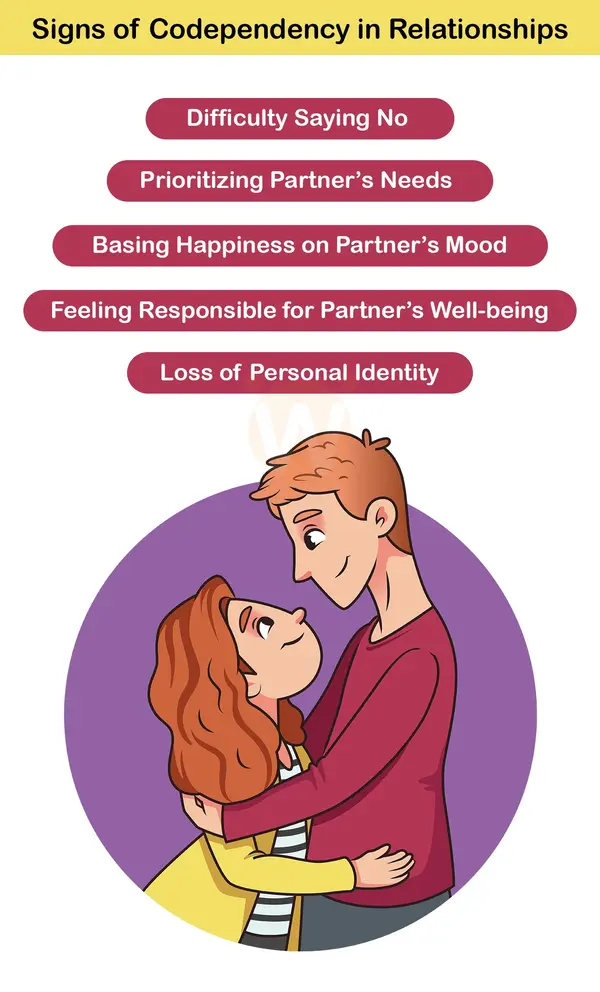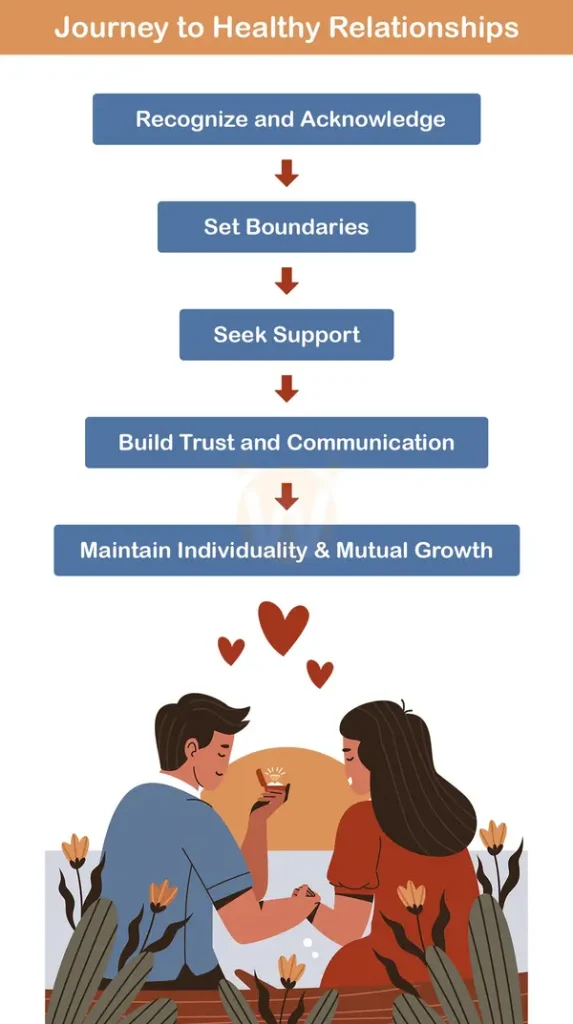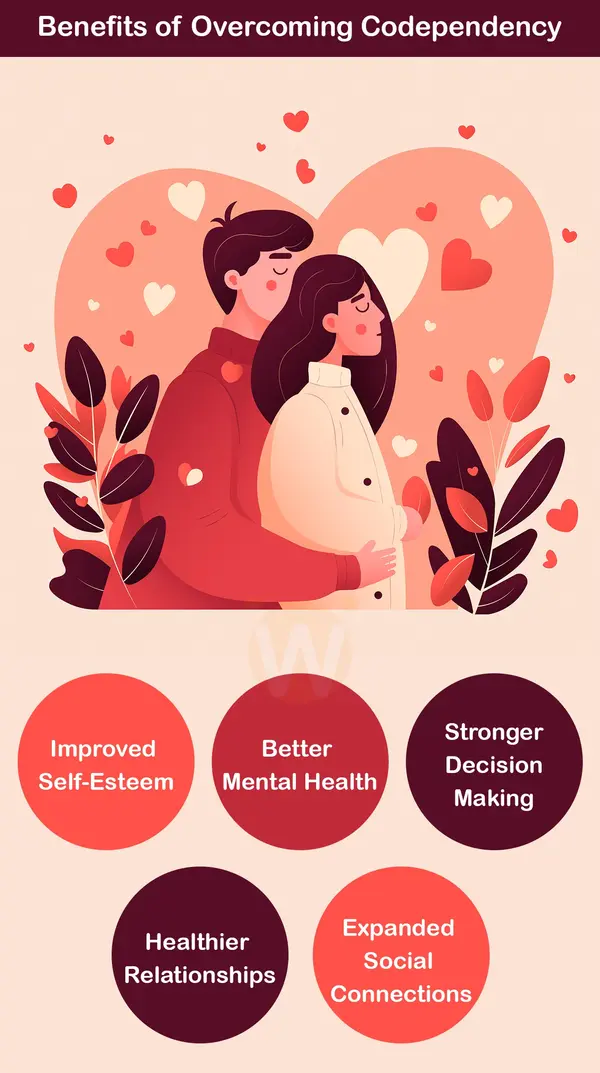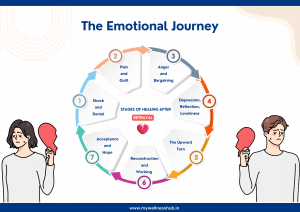Overcoming Codependency: A Guide to Healthier Relationships
By Prapoorna M
Last Updated: February 26, 2024
Have you ever felt like your happiness hinges entirely on someone else’s mood or actions? Or perhaps you find yourself constantly prioritizing the needs of others over your own, to the point where your own desires and needs seem insignificant. This dear reader, is what we call codependency, a complex relationship dynamic that’s more common than you might think.
In our quest for healthier, more fulfilling relationships, understanding codependency is crucial. It’s a pattern where one partner excessively relies on the other for emotional, psychological, or even physical support. While it might seem like a form of deep connection at first, codependency often leads to an unhealthy balance, affecting one’s sense of self and well-being.
Book Relationship Counselling now.
Understanding Codependency

Codependency might sound like a complicated term, but it’s a concept many of us encounter in our relationships. Simply put, codependency is a relationship pattern in which one person becomes excessively emotionally or psychologically reliant on another. These relationships often involve an imbalanced level of give and take.
In this dance of codependency, there are usually two roles: the caretaker and the taker. The caretaker often gives too much – time, energy, support – at the expense of their own needs. They feel a compelling need to take care of the other person, often deriving their self-worth from this role. On the flip side, the taker in the relationship depends on this level of care and support, sometimes without giving much in return.
So, how can you tell if you’re in a codependent relationship? Here are some signs:
- You find it hard to say ‘no’ to your partner, even at the cost of your own well-being.
- Your mood and happiness are heavily influenced by how your partner feels or behaves.
- You go to great lengths to avoid conflict in the relationship.
- Your sense of purpose revolves around making sacrifices to satisfy your partner’s needs.
Understanding these dynamics is crucial, similar to recognizing Signs of a Broken Relationship.
Causes and Triggers of Codependency
The roots of codependency often stretch deep into one’s past. Childhood trauma, such as growing up in a household with addiction, abuse, or neglect, can lay the groundwork for codependent behaviors later in life. These early experiences can instill a deep-seated need to care for others, often at one’s own expense, as a means of coping with past pain or instability.
Low self-esteem is another significant contributor. If you’re constantly feeling unworthy or undervalued, you might find yourself clinging to relationships where you can ‘prove’ your worth by being indispensable to someone else.
Causes of Codependency
| Cause | Brief Explanation |
|---|---|
| Childhood Trauma | Experiences of abuse, neglect, or other traumatic events in childhood can lead to codependent behaviors as coping mechanisms in adult relationships. |
| Low Self-Esteem | Individuals with low self-esteem may rely excessively on others for validation and approval, leading to codependent patterns where their self-worth is tied to another person. |
| Family Dynamics | Growing up in a family where boundaries are unclear or unhealthy (like with an addicted or narcissistic parent) can set the stage for future codependent relationships. |
| Social Conditioning | Societal expectations and norms can sometimes glorify self-sacrifice and caring for others at the expense of one’s own needs, fostering codependent tendencies. |
Family dynamics play a crucial role too. Growing up in a family where boundaries were blurred or non-existent can set the stage for codependent tendencies. This lack of boundaries often leads to adulthood where distinguishing between one’s own needs and the needs of others becomes a struggle.
Moreover, social conditioning can’t be ignored. In many cultures, self-sacrifice is glorified, and setting personal boundaries is often seen as selfish. This belief system can encourage codependent behaviors, making it challenging to prioritize one’s own needs and desires.
Family influence is significant, as seen in our exploration of Relationships Between Mother-In-Law and Daughter-In-Law.
The Impact of Codependency on Mental Health
Living in a codependent relationship is like walking on a tightrope of emotions – it can deeply impact your mental health, often in ways you might not immediately recognize. Let’s unpack how codependency can affect crucial aspects of your mental wellbeing.
Firstly, codependency often erodes self-esteem. When your worth becomes tied to how much you can ‘do’ for someone else, it can leave you feeling perpetually inadequate or unvalued. It’s like trying to fill a cup that has an invisible hole at the bottom – no matter how much you pour in, it never seems enough.
Trust, too, becomes a casualty in codependent dynamics. You may start doubting your judgment or second-guessing your decisions, especially if they don’t align with the desires of the ‘taker’ in the relationship. This constant self-doubt can lead to decision-making paralysis, where making even the simplest choice feels daunting.
The emotional toll of codependency is significant. It can manifest as a constant undercurrent of stress, anxiety, or depression, stemming from the fear of losing the relationship or not being ‘enough’ for the other person. Over time, this can lead to emotional burnout, a state where you feel emotionally drained, exhausted, and detached.
For more on coping with emotional challenges, read about Dealing with Disappointment.
Breaking Free from Codependency
But there’s good news – codependency is not a life sentence. You can break free from its chains and reclaim your sense of self. Here are some practical steps to start this liberating journey:
- Identify Codependent Behaviors: Awareness is the first step. Recognize patterns in your relationship that signal codependency – like sacrificing your needs for others or feeling responsible for your partner’s emotions.
- Set Boundaries: It’s crucial to establish what you’re comfortable with and what crosses the line. Boundaries are not about keeping people out; they’re about protecting your mental space. This could mean saying no to requests that drain you or asking for space when you need it.
- Embrace Self-Care: Self-care is not selfish; it’s essential. This could be as simple as setting aside time for hobbies, practicing mindfulness, or seeking support from friends or therapy. Remember, you can’t pour from an empty cup.
- Value Yourself: Shift the focus back to yourself. Recognize your worth independent of your role in someone else’s life. Celebrate your strengths, indulge in activities that make you happy, and remember that your needs are as important as anyone else’s.
Learn more about the importance of saying no in Why Saying No in a Relationship is a Good Thing.
Building Healthy Relationships

After understanding and working through the challenges of codependency, what does the landscape of a healthy relationship look like? It’s a relationship where balance, mutual respect, trust, and effective communication are the cornerstones. Here are some key aspects to focus on:
- Mutual Respect: This means honoring each other’s opinions, feelings, and needs. It’s about accepting differences without judgment and appreciating each other for who you are, not just for what you do for each other.
- Trust: A healthy relationship requires a solid foundation of trust. This involves being honest, reliable, and consistent in your actions and words. Trust also means feeling secure that your partner will respect your boundaries and not exploit your vulnerabilities.
- Effective Communication: Open, honest, and clear communication is vital. It’s not just about talking but also listening and understanding each other’s perspectives. Healthy communication involves expressing your own needs and being receptive to your partner’s needs without feeling threatened or overwhelmed.
- Maintaining Individuality: While it’s beautiful to share a life together, it’s equally important to have your own identity, interests, and friendships. Encourage each other to pursue personal hobbies and spend time apart. This independence enriches your relationship and keeps it dynamic and growing.
Explore further relationship insights in Better Ways to Communicate in Relationships.
Seeking Help and Support

Recognizing when to seek help is a sign of strength, not weakness. If you find yourself struggling with codependency, don’t hesitate to reach out for professional support. Therapy and support groups can provide invaluable guidance and tools for navigating these challenges.
- Therapy: A therapist can help you understand the root causes of your codependent behaviors, develop healthy coping strategies, and guide you in building stronger, more independent relationships.
- Support Groups: Organizations like Co-Dependents Anonymous (CoDA) and the National Alliance on Mental Illness (NAMI) offer support groups where you can share experiences and learn from others who are facing similar challenges.
Therapy vs. Support Groups in Overcoming Codependency
| Aspect | Therapy | Support Groups |
|---|---|---|
| Purpose | Individualized treatment focusing on personal history and patterns | Peer support and shared experiences in a group setting |
| Benefits | Tailored strategies, professional guidance, personal introspection | Community support, shared experiences, mutual understanding |
| Method | One-on-one sessions with a trained therapist | Group meetings led by a facilitator or peer-led discussions |
| Ideal For | Those seeking personalized guidance and confidentiality | Individuals looking for community support and relatability |
Discover our Online Counselling Services for personalized guidance and support.
Conclusion
As we wrap up our journey through the intricate landscape of codependency and the path to healthier relationships, let’s reflect on the key takeaways. Codependency, though a complex and challenging pattern, is not an insurmountable obstacle. By recognizing the signs, understanding its roots, and taking proactive steps, you can transform your relationships into sources of strength and mutual growth.
Remember, overcoming codependency is not just about breaking free from unhealthy relationship patterns; it’s about embracing a journey of personal growth and self-discovery. It’s about learning to value yourself, setting healthy boundaries, and nurturing relationships that respect your individuality and needs.
Here at Wellness Hub, we understand that this journey isn’t always straightforward. It’s a path filled with learning and growth, and sometimes, a little help along the way can make a big difference. That’s why we’re committed to providing resources, support, and guidance to help you navigate the complexities of relationships and personal well-being.
So, as you move forward, remember that each step, no matter how small, is a leap towards a healthier, more fulfilling life. Embrace the journey with patience and kindness towards yourself, and know that in the realm of relationships, the most rewarding connections are those that allow both individuals to thrive, independently and together.
For more about personal development, check out our article on The Art of Sleeping.
Frequently Asked Questions
1. What is codependency in a relationship?
Codependency is a behavioral pattern where one partner excessively relies on the other for emotional, psychological, or physical support, often leading to an unbalanced and unhealthy relationship dynamic.
2. How can I tell if I’m in a codependent relationship?
Signs of codependency include struggling to say no, prioritizing your partner’s needs over your own, basing your happiness on your partner, and having difficulty maintaining your individuality in the relationship.
3. What causes codependency in relationships?
Codependency often stems from childhood experiences, such as trauma, low self-esteem, or growing up in a household with unclear boundaries. Social conditioning and learned behaviors can also contribute.
4. Why is it important to overcome codependency?
Overcoming codependency is crucial for your mental health and well-being. It helps build self-esteem, trust in relationships, and the ability to make independent decisions. It also leads to healthier, more balanced relationships.
5. Can therapy help with overcoming codependency?
Yes, therapy can be highly beneficial in addressing and overcoming codependency. Therapists can assist in understanding the underlying causes, developing healthier coping strategies, and guiding toward building stronger relationships.
6. How can I maintain my individuality in a relationship?
Maintaining individuality involves setting personal boundaries, pursuing your own interests and hobbies, spending time apart, and ensuring that your personal goals and values are respected in the relationship.
7. Are there support groups for codependency?
Yes, there are support groups such as Co-Dependents Anonymous (CoDA) that offer a community for sharing experiences and learning from others who face similar challenges in codependent relationships.
8. How does setting boundaries help in a codependent relationship?
Setting boundaries helps you define what you are comfortable with and protects your mental space. It allows you to express your needs and preferences and ensures that your wellbeing is not compromised for the sake of the relationship.
9. Where can I find more resources about overcoming codependency?
For more resources on overcoming codependency, visit our platform offers a range of articles, expert advice, and support to guide you through your journey.
About the Author:
Prapoorna, M.Sc., M.A., (Dual Masters in Psychology & English) – Counselor (6+ years of experience)
Prapoorna armed with a passionate dedication fueled by dual Master’s degrees in Psychology and English, Prapoorna sheds light on and elevates human experiences. Over 6+ years of experience fuel her insightful approach to counseling, offering profound empathy and guidance across diverse areas like online, marital, relationship, child, family, and career counseling. This dedication to empowering positive change is further underscored by her specialized training in various counseling sectors.
Currently, at Wellness Hub, she thrives in a team environment that values innovation, compassion, and achieving results for their clients.
Connect with Prapoorna to learn more about how she can help you or your loved one find their voice and build a brighter future.
Book your Free Consultation Today
Parent/Caregiver Info:
Client’s Details:
* Error Message









